


January,26 2023
Each week, discover one of the members of the Network of Houses and Museums of European Musicians. These places link the past, present and future, they honor a tangible and intangible heritage and fulfill an essential cultural purpose in Europe. This week, a few days before the Mozart Week in Salzburg (Austria), we present the Mozarteum Foundation dedicated to the great composer.
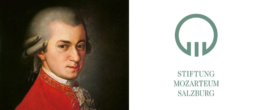
January 27 marks the anniversary of the birth of Wolfgang Amadeus Mozart (1756-1791). On this occasion, his birthplace, Salzburg, hosts an internationally renowned event. Every year since 1956, the Mozarteum Foundation in Salzburg has been organising Mozart Week (January 26 to February 3): an international festival with the finest international music stars.
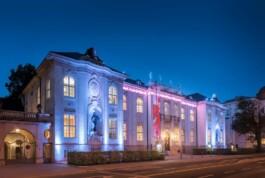
The Salzburg Mozarteum Foundation
The Salzburg Mozarteum Foundation, organizer of the event, is a member of the network of Houses and Museums of European Musicians initiated by the Centre Européen de Musique and its founding chairman Jorge Chaminé in 2022.
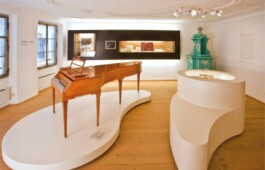
The museums of the Mozartum Foundation in Salzburg hold the largest collection of objects belonging to, dedicated to and about the life and work of Mozart
This non-profit organisation was founded in 1880 by citizens of the city of Salzburg with the mission to : "To make the music, life and personality of Mozart accessible to all people and generations. An approach that builds a bridge between tradition and contemporary culture''. The aim is to give people a multifaceted approach to the composer. The foundation organizes concerts, manages the two Mozart museums and supports academic research. "These three fundamental areas are aimed not only at preserving and encouraging tradition, but also at opening up to new perspectives and approaches when discovering Mozart's works''. Finally, Mozart's widow Constanze, who lived in Salzburg from 1824, and his two sons Carl Thomas and Franz Xaver Wolfgang, donated the majority of the composer's personal effects and memorabilia to the former foundation. The present Foundation thus owns the world's largest collection of original letters, portraits and instruments of the Mozart family.
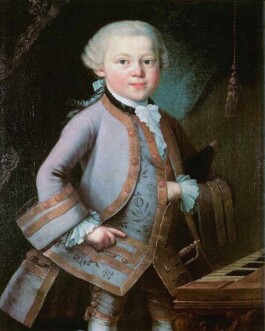
The young Mozart, musical child prodigy
As a child prodigy, Mozart embarked on a European tour with his parents and sister at the age of seven. This tour (1763-1766) took the young Mozart to London where he composed his first symphonies. Before this trip to London, the Mozart family met the philosophers of the Enlightenment (Melchior Grimm, Diderot, d'Alembert, etc.) during their stay in Paris. During this tour, the young prodigy impressed the public. A virtuoso, Mozart showed exceptional talent on the harpsichord, then on the fortepiano, but also on the violin and the organ. Cosmopolitan and European through his experience and encounters throughout Europe, he made friends with two musicians who had a major influence on him: Johann Schobert in Paris, and Johann Christian Bach, Johann Sebastian Bach's youngest son.
At the age of 12, he composed two operas for the emperor's court in Vienna, Bastien and Bastienne and La finta semplice. At the age of 14, Mozart was admitted to the Philharmonic Academy, which in principle only admits members over the age of twenty, after being made a knight in the Order of the Golden Spur by Pope Clement XIV. After several return trips between Salzburg, Milan and Bologna, marked by encounters, including that of Haydn, Mozart returned to his native city in 1777 after resigning his position as Kapellmeister to the Archbishop of Salzburg. Accompanied by his mother he travelled and stayed in Munich, Augsburg and Mannheim. His mother died the following year during a new trip to Paris, during which he composed his Symphonie Parisienne (K. 297).
After settling in the cosmopolitan city of Vienna in 1781, he marries Constanze Weber the following year. A few years later, he became friends with the librettist Lorenzo Da Ponte. His operas The Marriage of Figaro and Don Giovanni (1786-1787) with librettos by Da Ponte were huge successes.
In the 1850s, the great musician Pauline García Viardot acquired the original manuscript of Don Giovanni. She had a thuja wood box made to protect this treasure and donated it during her lifetime to the Conservatoire national supérieur de musique et de danse de Paris. This treasure of the history of music is now preserved in the same case and in remarkable condition in the French National Library.
In 1825, Manuel García, Pauline Viardot's father, left on a tour of America with his entire family, including the young Pauline, who was only 4 years old at the time. In New York, on 23 May 1826, at the request of Lorenzo da Ponte, his friend who had emigrated to the United States, he gave the American premiere of Don Giovanni with his daughter Maria (María-Felicia García, known as La Malibran) in the role of Zerlina.
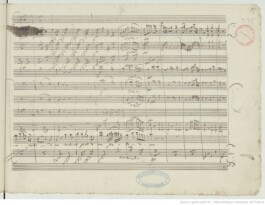
The manuscript score of Don Giovanni now in the National Library of France
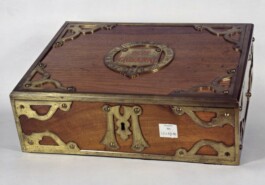
The Thuja box that Pauline Viardot had made containing the manuscript of Don Giovanni
In 1787 Mozart became musician to the imperial and royal chamber under the Austrian emperor Joseph II, a great music lover and patron of the arts. He lost his father, with whom he had broken up the same year. The composer of more than six hundred works died suddenly on 5 December 1791 at the age of 36. The causes of his death remain mysterious: one hundred and forty causes of death have been listed by the German researcher and psychiatrist, Lucien Karhausen. Nevertheless, one thing is certain: this genius musician has become a legend.
For more information : The Salzburg Mozarteum Foundation
January,26 2023
Each week, discover one of the members of the Network of Houses and Museums of European Musicians. These places link the past, present and future, they honor a tangible and intangible heritage and fulfill an essential cultural purpose in Europe. This week, a few days before the Mozart Week in Salzburg (Austria), we present the Mozarteum Foundation dedicated to the great composer.

January 27 marks the anniversary of the birth of Wolfgang Amadeus Mozart (1756-1791). On this occasion, his birthplace, Salzburg, hosts an internationally renowned event. Every year since 1956, the Mozarteum Foundation in Salzburg has been organising Mozart Week (January 26 to February 3): an international festival with the finest international music stars.

The Salzburg Mozarteum Foundation
The Salzburg Mozarteum Foundation, organizer of the event, is a member of the network of Houses and Museums of European Musicians initiated by the Centre Européen de Musique and its founding chairman Jorge Chaminé in 2022.

The museums of the Mozartum Foundation in Salzburg hold the largest collection of objects belonging to, dedicated to and about the life and work of Mozart
This non-profit organisation was founded in 1880 by citizens of the city of Salzburg with the mission to : "To make the music, life and personality of Mozart accessible to all people and generations. An approach that builds a bridge between tradition and contemporary culture''. The aim is to give people a multifaceted approach to the composer. The foundation organizes concerts, manages the two Mozart museums and supports academic research. "These three fundamental areas are aimed not only at preserving and encouraging tradition, but also at opening up to new perspectives and approaches when discovering Mozart's works''. Finally, Mozart's widow Constanze, who lived in Salzburg from 1824, and his two sons Carl Thomas and Franz Xaver Wolfgang, donated the majority of the composer's personal effects and memorabilia to the former foundation. The present Foundation thus owns the world's largest collection of original letters, portraits and instruments of the Mozart family.

The young Mozart, musical child prodigy
As a child prodigy, Mozart embarked on a European tour with his parents and sister at the age of seven. This tour (1763-1766) took the young Mozart to London where he composed his first symphonies. Before this trip to London, the Mozart family met the philosophers of the Enlightenment (Melchior Grimm, Diderot, d'Alembert, etc.) during their stay in Paris. During this tour, the young prodigy impressed the public. A virtuoso, Mozart showed exceptional talent on the harpsichord, then on the fortepiano, but also on the violin and the organ. Cosmopolitan and European through his experience and encounters throughout Europe, he made friends with two musicians who had a major influence on him: Johann Schobert in Paris, and Johann Christian Bach, Johann Sebastian Bach's youngest son.
At the age of 12, he composed two operas for the emperor's court in Vienna, Bastien and Bastienne and La finta semplice. At the age of 14, Mozart was admitted to the Philharmonic Academy, which in principle only admits members over the age of twenty, after being made a knight in the Order of the Golden Spur by Pope Clement XIV. After several return trips between Salzburg, Milan and Bologna, marked by encounters, including that of Haydn, Mozart returned to his native city in 1777 after resigning his position as Kapellmeister to the Archbishop of Salzburg. Accompanied by his mother he travelled and stayed in Munich, Augsburg and Mannheim. His mother died the following year during a new trip to Paris, during which he composed his Symphonie Parisienne (K. 297).
After settling in the cosmopolitan city of Vienna in 1781, he marries Constanze Weber the following year. A few years later, he became friends with the librettist Lorenzo Da Ponte. His operas The Marriage of Figaro and Don Giovanni (1786-1787) with librettos by Da Ponte were huge successes.
In the 1850s, the great musician Pauline García Viardot acquired the original manuscript of Don Giovanni. She had a thuja wood box made to protect this treasure and donated it during her lifetime to the Conservatoire national supérieur de musique et de danse de Paris. This treasure of the history of music is now preserved in the same case and in remarkable condition in the French National Library.
In 1825, Manuel García, Pauline Viardot's father, left on a tour of America with his entire family, including the young Pauline, who was only 4 years old at the time. In New York, on 23 May 1826, at the request of Lorenzo da Ponte, his friend who had emigrated to the United States, he gave the American premiere of Don Giovanni with his daughter Maria (María-Felicia García, known as La Malibran) in the role of Zerlina.

The manuscript score of Don Giovanni now in the National Library of France

The Thuja box that Pauline Viardot had made containing the manuscript of Don Giovanni
In 1787 Mozart became musician to the imperial and royal chamber under the Austrian emperor Joseph II, a great music lover and patron of the arts. He lost his father, with whom he had broken up the same year. The composer of more than six hundred works died suddenly on 5 December 1791 at the age of 36. The causes of his death remain mysterious: one hundred and forty causes of death have been listed by the German researcher and psychiatrist, Lucien Karhausen. Nevertheless, one thing is certain: this genius musician has become a legend.
For more information : The Salzburg Mozarteum Foundation


Playlist